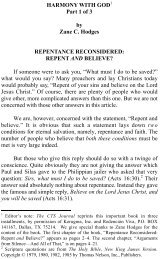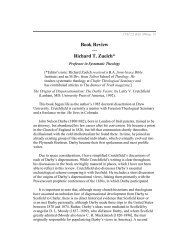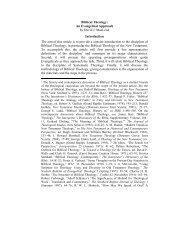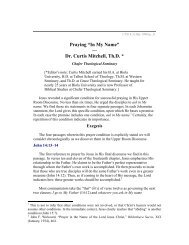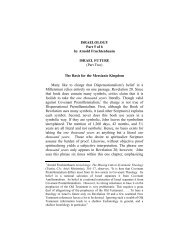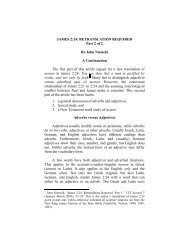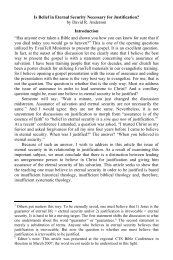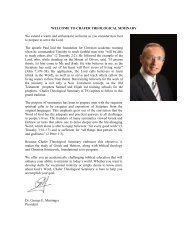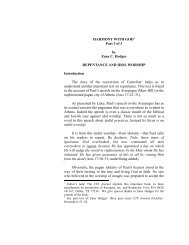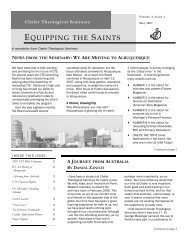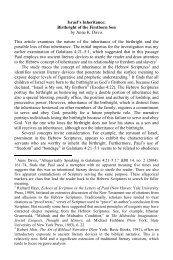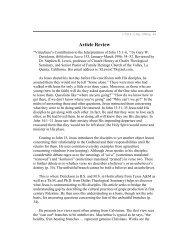ABIDING IN CHRIST - Chafer Theological Seminary
ABIDING IN CHRIST - Chafer Theological Seminary
ABIDING IN CHRIST - Chafer Theological Seminary
You also want an ePaper? Increase the reach of your titles
YUMPU automatically turns print PDFs into web optimized ePapers that Google loves.
Abiding in Christ 3<br />
believing’_had other views in common including an emphasis on<br />
the Old Testament use of the vine imagery to describe the spiritual<br />
status of Israel: Just as Israel was composed of believer and<br />
unbeliever, so too must the vine in John 15. In contrast, those who<br />
held to the latter position_‘abiding is fellowship’_did not<br />
emphasize the Old Testament vine analogy as hermeneutically<br />
relevant to John 15. For the most part these commentators were<br />
not only dispensational, but also free grace in their approach to<br />
soteriological and sanctification models. 1<br />
Since a consistent distinction between Israel and the Church<br />
is part of the sine qua non of traditional dispensational theology, 2<br />
we concluded that to understand abiding as the believer’s ongoing<br />
fellowship with Christ was most consistent with a dispensational<br />
theology. Exegetical analysis further demonstrated that the<br />
‘abiding is fellowship’ interpretation fit the lexical and syntactical<br />
data in the passage, while the ‘abiding is believing’ interpretation<br />
was insupportable exegetically.<br />
One of the presuppositions that affect interpretation and<br />
frequently explain this alignment is the relationship of the Church<br />
to Israel. According to the conclusions of the previous article the<br />
following logic developed: if a central factor in the interpretation is<br />
related to maintaining a consistent distinction between Israel and<br />
1 Free grace advocates affirm that salvation is by faith alone in Christ alone, that<br />
assurance of salvation can be certain in this life based on the knowledge that one<br />
has believed that Christ has died as a substitute for one’s sins. Moreover, failure<br />
to persevere does not indicate a person’s saved status. Lordship salvation is the<br />
consistent development from the Reformed doctrine of the perseverance of the<br />
saints. Lordship advocates affirm that salvation is by faith in Christ, but then<br />
add that genuine faith manifests discernible works in the life of the believer, the<br />
absence of which suggests a non-saving faith. Thus, one cannot truly know he<br />
has eternal life until death, since a person might eventually fall away from faith,<br />
reject Christ, and not persevere, thus indicating a non-genuine or non-saving<br />
faith.<br />
2 The threefold sine qua non of dispensationalism is: a distinction between<br />
God’s plan for Israel and the Church, a consistent literal hermeneutic, and the<br />
purpose of God in human history is doxological. Charles Ryrie,<br />
Dispensationalism (Chicago: Moody, 1995), 39–41.



